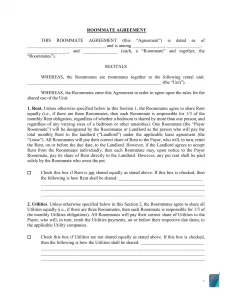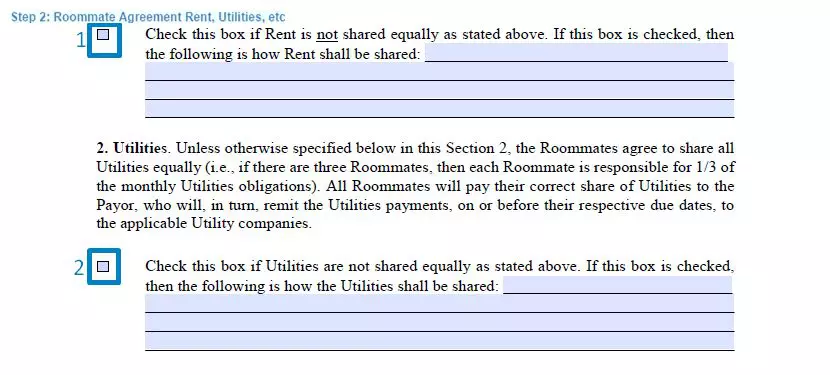Roommate Agreement Template
Roommate agreements are a legal document between two or more people who live in the same home, whether that home is an apartment, condo, or house.
Having an agreement is a good way to help avoid and mediate disagreements between roommates. Written roommate contracts are also significantly more enforceable than verbal agreements.
Even if you’re living with friends or people you’ve lived with for years, it’s critical to have a written rental agreement to protect everyone and your home.
Reasons to Use a Roommate Agreement
There are a lot of reasons to have a roommate agreement template. The most important of those reasons is that a written and signed agreement is much more legally binding than a verbal agreement.
That way if one of your roommates fails to pay the rent, you have at least one document proving that they agreed to pay and are liable for the late payment and any additional fees.
But legal considerations are only part of why you should plan on making a roommate contract anytime you move to a new home or get new roommates. Roommate agreements are also a chance to define common behaviors and what is and isn’t allowed.
For instance, you can include how a security deposit should be split between the roommates. You can also go over how the living room and other common areas can be used, when overnight guests are welcome, and more.
Having those rules in place from the start can help avoid conflicts and gives you a framework to solve problems when they arise.
Here are a few more reasons to have a roommate agreement:
- Gives you a framework to work with to solve conflicts
- Clarifies who is responsible for what
- Writing it gives you an opportunity to talk about expectations
- Roommate agreements are legal documents that can be used to demonstrate responsibility with your landlord or in courts in case of non-payment
- Covers what happens if someone needs to move out early
A roommate agreement is also a way to make sure all of your roommates are operating in good faith. A roommate who doesn’t want to respect the other people living in your home is likely to be less willing to sign a written agreement. Even a written agreement that’s reasonable and doesn’t have a lot of house rules.
It’s also important to remember that your roommate agreement is separate from your lease agreement with your landlord, even if your landlord lives in the same home as you. Your lease will typically only talk about what is and is not allowed on the property, and the obligations between tenant and landlord.
A roommate agreement is between you and your other roommates and can go into details about how you agree to behave, how you will share your obligations, and how you will resolve disputes.
Room Rental vs. Roommate Agreement
Room rentals and roommate agreements are two very different kinds of contracts, though there are times when you’ll need both.
It’s possible to rent out a room without being roommates with the person you’re renting to. A room rental agreement often indicates which parts of the property the tenant is allowed to occupy. It may cover a lot of the same things as a roommate agreement like monthly rent payment and due dates, the security deposit, and quiet hours, but it may also look more like a traditional lease than a roommate agreement.
The biggest difference is that a room rental is an agreement between the tenant and their landlord or the person subleasing the property.
Roommate agreements are strictly between the people living on the property. They can involve the landlord if the landlord lives on the property, but that is less common. A roommate agreement can go into more details about behavior than a typical room rental, and usually is created by all the roommates together, while a room rental is created by the landlord.
How to Find a Reliable Roommate
Finding reliable roommates is an art all it’s own, but it’s important to find the right person before you sign any agreements with them. Here are some tips for finding the right person for your home without spending months searching.
Ask People You Know
You may not want to ask friends of yours if they want to move in. After all, living together can put a strain on your relationship, especially if your living habits are different.
However, you should ask your friends if they know anyone who might be interested in moving in. Your friends will be one of the best judges of who will be a compatible roommate, especially if they’ve been over to your place and know your lifestyle.
Coworkers are another good resource for finding possible roommates. While they might not know you as well as your friends, they do have a good sense of your schedule and your coworkers may know you better than you think.
Remember that a recommendation isn’t enough on its own. You’ll still need to meet the person, and talk with them about your expectations and theirs to make sure it’s a good match for everyone.
Asking around can help you find roommates who might not come up in other searches. Since friends and family often look for housing in their inner circles before looking on housing sites and forums, you’ll likely have a better selection than you would if you looked online.
Meet and Interview Possible Roommates First
No matter how good a roommate looks on paper, you should meet them in person at least a couple of times before you sign any agreements or add them to your lease.
It also allows you to go over some of the details of your roommate contract and see if there is anything they disagree with or want to be added to the agreement before you sign.
Meeting also gives you a chance to talk details about your monthly rent and utility bills, and for your potential roommate to see the living space and decide if they want to live there.
Ask Questions
One of the things many people don’t do when they first meet a roommate is to ask good questions. Often you’re too worried about pushing the other person’s buttons to actually ask questions that help you determine if they are a good fit as a roommate.
Things like making sure they can afford the rent and talking about how you would handle things if you disagree while living together. Make sure they are familiar with the terms of the lease agreement and ask how they would like to handle obligations. Ask about overnight guests.
It might seem rude at first to ask if your roommate is in a relationship, but you should ask anyway. Knowing will help you figure out what living together will be like.
You should also ask about their cleaning habits and preferences. Having people who like similar levels of cleanliness can make any living situation less stressful.
Don’t be Afraid to Reject Candidates
Having a good roommate can make or break your living situation, and it’s important to be willing to say no if someone isn’t a good fit.
There’s a difference between a roommate that seems like a good option with a few compromises and a roommate that doesn’t want to keep the house the same way you do and has a highly incompatible lifestyle.
Saying no may be the best thing you can do if you get a roommate candidate that isn’t a good match.
What Should be Included in the Agreement?
Rent, Utilities, and Lease Obligations
One of the most important things to include in your roommate agreement is how things like your monthly rent and other lease obligations will be handled. You might decide to split the utility bill evenly, split unevenly, alternate who will pay rent and other bills, or a combination of different arrangements.
Make sure you cover everything covered in your lease, including things like mowing the lawn or shoveling the sidewalks.
If you have a security deposit, you should also discuss how that will be paid, and who will receive the returned deposit if you move.
House Rules
It’s also important to have a list of house rules and how you should use common areas. Discuss rules around overnight guests, public displays of affection, laundry, and dishes.
These are just examples, but if you can agree on these chores, food sharing, and other rules you’re much less likely to need to resolve a disagreement later.
Including all of your rules and household duties in your roommate agreement can help set clear expectations and make living together much easier, but only if all your roommates agree with the terms of the agreement.
Roommate Agreement Form Details
| Document Name | Roommate Agreement Form |
| Other Names | Roommate Contract, Rental Agreement for Roommates |
| Avg. Time to Fill Out | 10 minutes |
| # of Fillable Fields | 48 |
| Available Formats | Adobe PDF |
| Roommate Guide | |

Filling Out the Roommate Agreement
Step 1: Effective Date and Names
The first step to filling out a legally binding roommate contract is to write down the effective date and the names of everyone included in the agreement.

Step 2: Roommate Rent, Utilities, and Deposits
This section of your roommate agreement is probably the most legally important. You’ll write down the rent, and any requirements for paying it, how utilities will be handled, and how any security deposits or pet deposits will be paid.
All roommates must agree on this section. Our free roommate agreement template also includes a box to indicate if the rent, utilities, or other bills will be split unevenly.
The term section at the bottom of this area doesn’t need to be filled out. It just states that all roommates agree and will follow the agreement until and unless one of them moves out and is replaced by a new roommate.

Step 3: Shared Expenses and House Rules
In the next section, all roommates will write down their rules, with some optional rules already provided for you. Fill in weekend and weekday quiet hours, whether food will be shared or not, and mark if you agree to the rules about overnight guests.
In our roommate agreement template, some of these rules are already included, but you can modify them as needed.

Step 4: Disagreements, Smoking, and Other Provisions
Just like a good lease agreement should include some information on dispute resolution and changes to the agreed-upon rules.
In our template, this section just says that roommates will confer with one another if they disagree.
You’ll also need to decide if smoking is allowed. Even if your rental unit allows smoking your roommates may not want you to smoke inside, or may limit smoking to certain areas.
If you want to add any additional provisions, this is where you can do so. Consider whether you need rules about household chores, alcohol, food sharing, and noise level.

Step 5: Sign and Date
The last thing you need to do is sign and date your roommate agreement. You can sign it at the same time as your lease agreement, or later on. Even if you started living together without a roommate agreement you can still add one later, as long as all your roommates agree and are interested.

